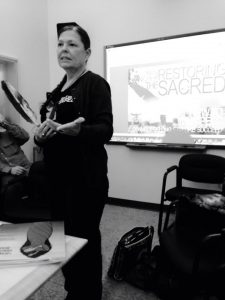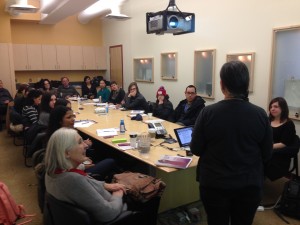Restoring our Sacred Identities
Our ongoing series of #UMNATV Colloquim reflections continues today with MA student Andrea St. Pierre, as she shares her thoughts about a recent presentation by Leslie Spillett.

Based on Leslie Spillett’s spirited discussion with us, the work she is involved in with Indigenous people in Winnipeg, and her daughter’s sincere and adoring introduction, I could tell that Leslie is very passionate about the work she is involved with at Ka Ni Kanichihk and about continuing her culture’s traditions. Leslie raised her children to be active members of their culture and traditions. I believe that learning about your background in a safe and nurturing environment is important in developing a strong identity. For some Indigenous people, being able to positively identify with who they are and where they from is very difficult, especially for those affected by multi-generational traumas (such as residential school). Luckily for Leslie’s children, they have a strong woman who is grounded in her traditions to teach them.
I was especially interested in Leslie’s perspective regarding the pervasive ideology that Indigenous people ought to view themselves as lesser than Euro-Canadians. Our existence (education system, family system, etc.) was undeniably questioned and attacked in various forms to eliminate or assimilate us. Multiple attempts of genocide in many different institutions were employed to rid our society of the “Indian problem.” For generations, Indigenous people were taught that their opinions and way of life were savage. Sadly, this is still evident in the media coverage, negative comments, and racism in our society.
Indigenous people must restore their identities to combat these harmful and vicious views of Indigenous people. We must be able to view ourselves as equally valid as our Euro-Canadian counterparts. It begins with us, with our people in our communities. If we do not believe that we are equal, we will never be equal. I once believed that I was not as smart or would not be as successful at my endeavors because I was an Indigenous girl. I sabotaged myself because I believed that I deserved less. When I became aware of the issues and reasons why I had this negative attitude, I was able to confidently learn about my culture and traditions, and push myself to succeed in various aspects in my life.
I agree that it is important to restore the sacred, to free us from colonialist attitudes. Similar to the Restoring the Sacred and At Our Relatives’ Place (AORP) programs at Ka Ni Kanichihk, my own research involves decolonizing attitudes based on traditional knowledges, traditions, and teachings. My research is specifically directed towards decolonizing sex and sexuality to benefit Indigenous youth. I believe that this is important because it benefits every living generation of Indigenous people, by educating us about our beliefs before contact with Europeans and how they have been altered since. Restoring traditional teachings regarding sex and sexuality would free Indigenous people from the colonized mindset.

I appreciated Leslie’s discussion with us and would like to thank her for giving us her time and thoughts. It was great to hear an Indigenous academic perspective into what is happening with Indigenous people. Although she claims that she is non-academic, I believe that Leslie is highly academic, not the Western concept of academia but the Indigenous concept, carrying with her an abundance of her people’s traditional and cultural knowledges. Unfortunately, this is a quality that many people sorely lack. I hope that society will be able to accept that Indigenous knowledge is a different and valid form of education that is not bound by the same limits as Western education.


Great post about Leslie Spillett’s presentation, Andrea. I found her presentation to be very interesting, and I was very impressed with the work she’s been doing with Ka Ni Kanichihk. I agree with your discussion of the contemporary perspective that views and pressures Indigenous people to view themselves in a negative light. Also, I am interested in your idea of restoration of identity as an approach to defeat this harmful ideology. Do you think Indigenous peoples and communities need to return to tradition to restore their identity? Tradition seems as though it can be very helpful in supporting Indigenous peoples and communities. There is a group in Sioux Falls, called the Inter-Tribal Cultural Alliance Inc., that supports Indigenous people in Sioux Falls while also providing these people the opportunity to participate in traditional events like drum groups and Lakota language classes. I would argue these organizations help to promote traditional culture and identity while also supporting the contemporary life and identity of Indigenous people living in urban settings. This is important because not all people have the opportunity to practice traditional activities. Also, tradition needs to spur communities and supporters into action. Tradition must be introduced in a fashion that allows Indigenous people and communities, as well as their non-Indigenous supporters, to fight the current colonial mentality relegating Indigenous people to the margins of society.
Thanks for this amazing and thought provoking post Andrea,
Joseph Dipple
#UMNATV Colloquium Student
I liked the honesty that you shared with readers, “I sabotaged myself because I felt I deserved less”, I did the same for along time, now I am thinking, do I still?
I was not as moved by Leslie’s presentation though, while she had strong points, I feel that Leslie really contradicted herself saying, “we don’t need more (indigenous) people getting Masters degree’s or PhD’s” then saying, “we are not sick, the system is sick, we can shut it down”. I have no argument it’s a paternalistic system in need of an overhaul, and yes, we do have a growing capacity, but, how else are we supposed to shut the industry down when our people who are not as educated as other people in the world who we are competing with in job markets, ect. – We will just end up with more headlines like “Flood money paid for CEO’s romantic trip” (Winnipeg Free Press, May 23, 2013) that Manitoba Association of Native Firefighters boss Darren Mini Found himself in. Lastly, the “we are not sick” comment, I would argue the nature of communities has changed, hard drugs, and that deeply internalized inferior feeling leaves too many sabotaging their lives. We need more educated people helping in the decolonization process.
Spillet had too much shock value statements that were not backed up.